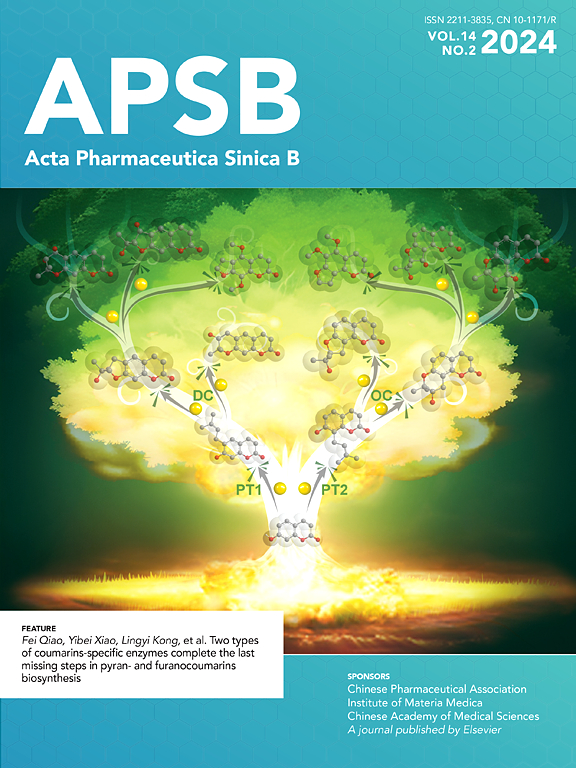PRDX1-DOK3相互作用的增强通过抑制浆细胞分化来缓解类风湿关节炎的进展
IF 14.6
1区 医学
Q1 PHARMACOLOGY & PHARMACY
引用次数: 0
摘要
类风湿关节炎(RA)是一种慢性自身免疫性疾病,其特点是持续的炎症和关节损伤,并伴有浆细胞的积累,这是其发病机制的一部分。了解类风湿关节炎浆细胞分化过程中发生的遗传改变可以加深我们对其发病机制的理解,并指导有针对性的治疗干预措施的发展。在这里,我们的研究通过证明PRDX1与DOK3相互作用并通过自噬-溶酶体途径调节其降解,阐明了浆细胞分化背后复杂的分子机制。这种相互作用导致浆细胞分化的抑制,从而缓解胶原诱导关节炎的进展。此外,我们的研究发现丹酚酸B (SAB)是一种有效的小分子胶样化合物,可以增强PRDX1和DOK3之间的相互作用,从而通过抑制浆细胞分化来阻止胶原诱导关节炎的进展。总之,这些发现强调了开发PRDX1-DOK3复合物的化学稳定剂在抑制浆细胞分化以治疗RA方面的治疗潜力,并为靶向prdx1蛋白相互作用作为各种疾病的特异性治疗靶点奠定了理论基础。本文章由计算机程序翻译,如有差异,请以英文原文为准。

Augmentation of PRDX1–DOK3 interaction alleviates rheumatoid arthritis progression by suppressing plasma cell differentiation
Rheumatoid arthritis (RA) is a chronic autoimmune disease characterized by persistent inflammation and joint damage, accompanied by the accumulation of plasma cells, which contributes to its pathogenesis. Understanding the genetic alterations occurring during plasma cell differentiation in RA can deepen our comprehension of its pathogenesis and guide the development of targeted therapeutic interventions. Here, our study elucidates the intricate molecular mechanisms underlying plasma cell differentiation by demonstrating that PRDX1 interacts with DOK3 and modulates its degradation by the autophagy–lysosome pathway. This interaction results in the inhibition of plasma cell differentiation, thereby alleviating the progression of collagen-induced arthritis. Additionally, our investigation identifies Salvianolic acid B (SAB) as a potent small molecular glue-like compound that enhances the interaction between PRDX1 and DOK3, consequently impeding the progression of collagen-induced arthritis by inhibiting plasma cell differentiation. Collectively, these findings underscore the therapeutic potential of developing chemical stabilizers for the PRDX1–DOK3 complex in suppressing plasma cell differentiation for RA treatment and establish a theoretical basis for targeting PRDX1-protein interactions as specific therapeutic targets in various diseases.
求助全文
通过发布文献求助,成功后即可免费获取论文全文。
去求助
来源期刊

Acta Pharmaceutica Sinica. B
Pharmacology, Toxicology and Pharmaceutics-General Pharmacology, Toxicology and Pharmaceutics
CiteScore
22.40
自引率
5.50%
发文量
1051
审稿时长
19 weeks
期刊介绍:
The Journal of the Institute of Materia Medica, Chinese Academy of Medical Sciences, and the Chinese Pharmaceutical Association oversees the peer review process for Acta Pharmaceutica Sinica. B (APSB).
Published monthly in English, APSB is dedicated to disseminating significant original research articles, rapid communications, and high-quality reviews that highlight recent advances across various pharmaceutical sciences domains. These encompass pharmacology, pharmaceutics, medicinal chemistry, natural products, pharmacognosy, pharmaceutical analysis, and pharmacokinetics.
A part of the Acta Pharmaceutica Sinica series, established in 1953 and indexed in prominent databases like Chemical Abstracts, Index Medicus, SciFinder Scholar, Biological Abstracts, International Pharmaceutical Abstracts, Cambridge Scientific Abstracts, and Current Bibliography on Science and Technology, APSB is sponsored by the Institute of Materia Medica, Chinese Academy of Medical Sciences, and the Chinese Pharmaceutical Association. Its production and hosting are facilitated by Elsevier B.V. This collaborative effort ensures APSB's commitment to delivering valuable contributions to the pharmaceutical sciences community.
 求助内容:
求助内容: 应助结果提醒方式:
应助结果提醒方式:


